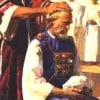Did Moses Have Two Wives – Zipporah And The Ethiopian Woman?
Hi ngureco,
The Bible tells us Moses had one wife and two sons. Zipporah was from the land of Cush, which made her from Ethiopia. So Zipporah was Moses one and only Ethiopian wife.
You can check this for yourself by reading the second book of the Bible, Exodus, chapter 18 which describes the reunion that took place between Moses, his father-in-law, his wife and his sons.
Cross reference that with the 4th book of the Bible, Numbers and read Chapter 12 verse 1, where she is referred to as his Cushite wife, or Ethiopian wife, depending on your translation. Chapter 12 describes the jealousy Moses' sister, Miriam felt toward Zipporah and how she was punished by God for her gross disrespect toward Moses, her brother.
If you have any questions feel free to e-mail me.
~JenMoses had two wives.
1) Zipporah: Exodus 2:15-16,21 and Exodus 18:1-6
2) Ethiopian woman: Numbers 12:1(-15)
Zipporah was not the "Ethiopian woman" herself. Zipporah was of the tribe of Midian. Genesis 25:1-3 shows that Midian was one of the six sons born unto Abraham by his third wife, Keturah. Thus, Zipporah was "Abrahamic", who was "Shemitic" (i.e., descended of Noah's son Shem, per Genesis 10:1; 11:11-27). But the "Ethiopian woman" ("Cushite woman" in the Hebrew) descended of Cush, who was "Hamitic" (i.e., descended of Noah's son Ham, per Genesis 10:1,6). Indeed, Zipporah, being of Noah's son, Shem, could not be the "Ethiopian woman" who was of Ham (Shem's brother).
Also, the timing of Moses' marriage to the Ethiopian woman can be determined by Numbers 33:1-49,17 and 11:35 with 12:16 which "surrounds" the story about Moses marrying the Ethiopian woman in Numbers 12:1-15. This is clearly much later than the time when Moses married Zipporah in Exodus 2:15,22.
Therefore, the Shemitic/Abrahamic Midianitess Zipporah could not possibly be the Hamitic/non-Abrahamic "Ethiopian woman".Just a correction on the answer below:
Zipporah was a Midianite that's true, but there is no Abrahamic connection to her as the blood line was through the female side after Noah. This means that only Sarah's offspring i.e. Isaac can claim Abrahamic descendancy (Sarah was Abraham's half sister), all the others have to claim their descendancy from their own female ancestors. Hence we have Ishmael (forefather of the Arabs or Ishmaelites) from Hagar, Sarah's Egyptian hand maid who did not inherit the birthright, but rather, Isaac.
This therefore makes Zipporah a Caananite from whom the Midianites were descended and therefore Hamitic, not Shemitic.Ngureco-
An important note: as per the Rabbinic Jewish world, there are multiple points of view and *all* are considered valid.
Why? As in the famous instance from the Gemara (Talmud) of Hillel and Shammai arguing how to interpret the Law, and drawing polar opposite views, a voice from Heaven intercedes and speaks, "These and Those are the words of the living G-d."
The Lord is infinite and encompasses all possibilities.
This is an excellent question, one that many great thinkers and rabbis have struggled with over the years. There is no consensus when it comes to Torah commentary, and there are as many viewpoints on this subject as there are writers.
Two sources to check out with excellent background research are:
http://ohave.tripod.com/chumash/lashon.htm
and
http://rchaimqoton.blogspot.com/2007/07 … -wife.html
They're both written by respectable rabbis and cover the topic thoroughly.
Be very careful when researching Biblical subject matter. The answer is not always on the surface level. Anyone who claims knowledge better be able to back it with facts drawn from the source material itself. There are many persons on the internet who claim knowledge that have no idea how deep the subject matter actually goes.
Best wishes and may G-d bless your search.Of course he did. Read my answer at http://hubpages.com/hub/The-Ethiopian-Princess
Zipporah was Ethopian as far as the Bible tells us. The historian Josephus will try to tell you in his, "Antiquities of the Jews", that Moses married an Ethiopian princess when he was a commander in the Egyptian army under Pharoah before God began to us him. There is a possiblity then that he may have had two Ethiopian wives. There has been some further research on this subject by Catherine Clark Kroeger the founder of Christians for Biblical Equality. I have several of her video VHS tapes on this subject along with an article "Black History in the Early Church" that has more information.. You might search CBE's web page for more details at: www.cbeinternational.com.
The LionswhelpHe married only once. The Prophet Musa (peace be upon him) packed up his luggage and left Pharaoh's house in the pitch dark when every one was enjoying a sound sleep. He reached Madian after a long tiresome journey. He sat down to take rest near a watering place.The Prophet Musa (peace be upon him) saw two young girls waiting at a distance. Their sheep were standing near the spring for drinking water. The Prophet Musa (peace he upon him) thought that the girls needed some help. Although he was tired and hungry yet he wished to help them. He went up to the girls and asked if they needed help. The girls were modest and bashful. They said that they were waiting so that the shepherds might go away. Thier father invited him for dinner. The Prophet Musa (peace be upon him) accompanied them. When be entered the house, he introduced himself politely; Soon after he dined with the members of the family. The Prophet Musa (peace be upon him) was asked to stay with them. The time passed on happily. One day the master of the house said:"I desire to marry one of these two daughters of mine to you on the condition that you should serve me for eight years but if you complete ten, it will be of your own free will, and I do not wish to be hard on you. If Allah pleases, you will find me one of good. He said: This will be an agreement between you and me. whichever of the two terms I fulfill, there shall be no wrong doing to me and Allah is a witness of what we say." (Surah 28: Verses 27-28) According to the agreement Prophet Musa (peace be upon him) got married to one of the girls of that family. He took care of the farm and the sheep efficiently. The Prophet Musa (peace be upon him) had been away from his family for many years.
I'm Ethiopian Messiah Jew. Yes Moses wife was Zipporah an Ethiopian Princess, Her father was King of Ethiopia and they had two sons. Many Ethiopian woman and men married into those in the desert. The Israelites.
Moses married an Ethiopian named Zipporah who was also identified or referred to as a midianite because these two races are one in the same they were both black. Also Hagar the Egyptian, the mother of Ishmael, son of Abraham was also called a Midianite because she was black or black skinned.
Moses had only one wife, it is the history of ancestral origin that's set in confusion in the Biblical account, we know that tribes and nations are two different thing.
Railton510 has the right answer. Zipporah was of Shemitic/Abrahamic descent. It would not be unusual for a man to have more than one wife. Moses would not have had the option of taking his first wife with him as he fled Egypt 40 years before the Exodus. Midian was to the east of the Egyptian capital, and Cush was to the South. And does the Bible say ALL descendants of Ham were Black? Had God already ordained strict racial lines in the sons of Noah? Or did "race" as we think of it in our time not occur until people were scattered and geographically isolated after the Tower of Babel? Maybe the only thing to be gathered from this story is that Miriam was a precursor to Euro-centrism?
Hmm, interesting take on this question. I see a lot of different answers but none that is actually correct.
People; Moses had THREE(3) wives that are referenced in the Bible and it's quite possible that he had more. However, only three, not two and definitely not one, are referenced.
We know from the scriptures that Moses had a father-in-law who was a Midianite, a father-in-law who was a Cushite, and a father-in-law who was a Kenite. Three father-in-laws, equal THREE(3) wives.
He may have had more, but there may have been no real reason to mention the others. We only know about the Kenite because it mentions the father-in-law. This father-in-law is again mentioned in chapter 4 of Judges verse 11. “Now Heber the Kenite, which was of the children of Hobab the father in law of Moses, had severed himself from the Kenites, and pitched his tent unto the plain of Zaanaim, which is by Kedesh” (Judges 4:11).
I wanted to list references to what I wrote above but I'm limited by this post. However, it is easy to find the scripture references.
Be blessed**Cush and Midian are 2 very different places ?
Cush is in Africa, in the area of present day Sudan and Ethiopia -- and Midian is in the area of present day Jordan and Saudi Arabia ?
Shalom in Yeshua.Most of the answers are incorrect. The Prophet Moses only had one wife: Zipporah the Medianite. The Cushitic Ethiopian Wife mentioned was only betrothed to Moses the King. Studying the Holy Scripture doesn't mean reading it 50 times, it necessitates and requires relative commentary or commentaries. This is why the Holy or Oral Tradition is absolutely necessary, or the complete meaning of word gets lost. That is how Protestantism in its context destroys Christianity and Apostolic tradition.
In short, Moses in exile fled beyond the Egyptian borders of that time. Yes, there were Egyptian borders at that time. He went into the lands of Cush, Upper Nubia or Ethiopia (as it is known today). At this time, he stumbled into the camp of the Ethiopian King and his army, who were situated outside of the capital city, also exiled from war. Moses ended up strategizing a plan for the King and his forces to recapture the kingdom, but during the battle, the Cushitic king died. Because of his expertise, Moses attained high rank and eventually was made king of these Cushites. As king, he was provided the Cushitic princess, who he refused to sleep with during his 40 year reign. Offended by this, she grew offended and informed the Cushites of his neglect and then he was exiled from the Cushitic kingdom.
The most important topic here is the pseudo-rebuke of the prophet by his sister Mariam, who was endowed with a certain level of prophecy at this time, accused Moses of being married to this Cushitic woman, when in reality, he had no relations with her other than honoring her virginity! The lesson here from God is even if a person has a gift of prophecy, they should use their discretion and gift wisely, not only for intellectual purposes, but for the work and faith of the Almighty. This is why she was struck with leprosy, but cured through intercession of the meek; as it says in the next verses: "Who was meek in the world in the sight of the Lord except Moses his faithful servant?"
You can read detailed commentary of certain rabbis and/or the Ethiopian Orthodox Church's commentary. It has nothing to do with racial inferiority as even some rabbis and most sophomoric readers suggest. If this was the case, how is it that according to Ethiopian and Yemeni tradition, the Queen of Saba, the Cushites have King Solomon's first son? If you don't believe this, the Lord Jesus Christ himself mentions 'the queen of the south: Queen of Sheba/Saba."
Related Discussions
- 3
what was the name of prophet moses wife
by anjum1 15 years ago
what was the name of prophet moses wife
- 25
Is Having Two Wives Adulterous?
by ngureco 9 years ago
Is Having Two Wives Adulterous?
- 256
Why Do Wives Get Mad With Husbands Watching Porn? How Does It Interfere With Mar
by ngureco 7 years ago
Why Do Wives Get Mad With Husbands Watching Porn? How Does It Interfere With Marriage?
- 82
Do you know Muhammad (Peace be upon Him) ?
by mrnasir 11 years ago
http://en.wikipedia.org/wiki/The_100What Non-Muslims said about Him?http://www.gainpeace.com/index.php?opti … Itemid=105
- 34
Prophet Muhammad (Peace be upon him) the most Peaceful man
by gulnazahmad 14 years ago
Prophet Muhammad was the most peaceful man on the earth ever and he is and he will be. People who say that religion teaches aggression should know that all the prophets Muhammad, Jesus and Moses who followed their religion to the extremes were the most peaceful human beings. They never invoked any...
- 39
Does the Quran condemn violence and bloodletting?
by andrew savage 12 years ago
Can someone who has studied Islamic literature/scripture explain that killing people for having different religious view is not okay in the Quran?














